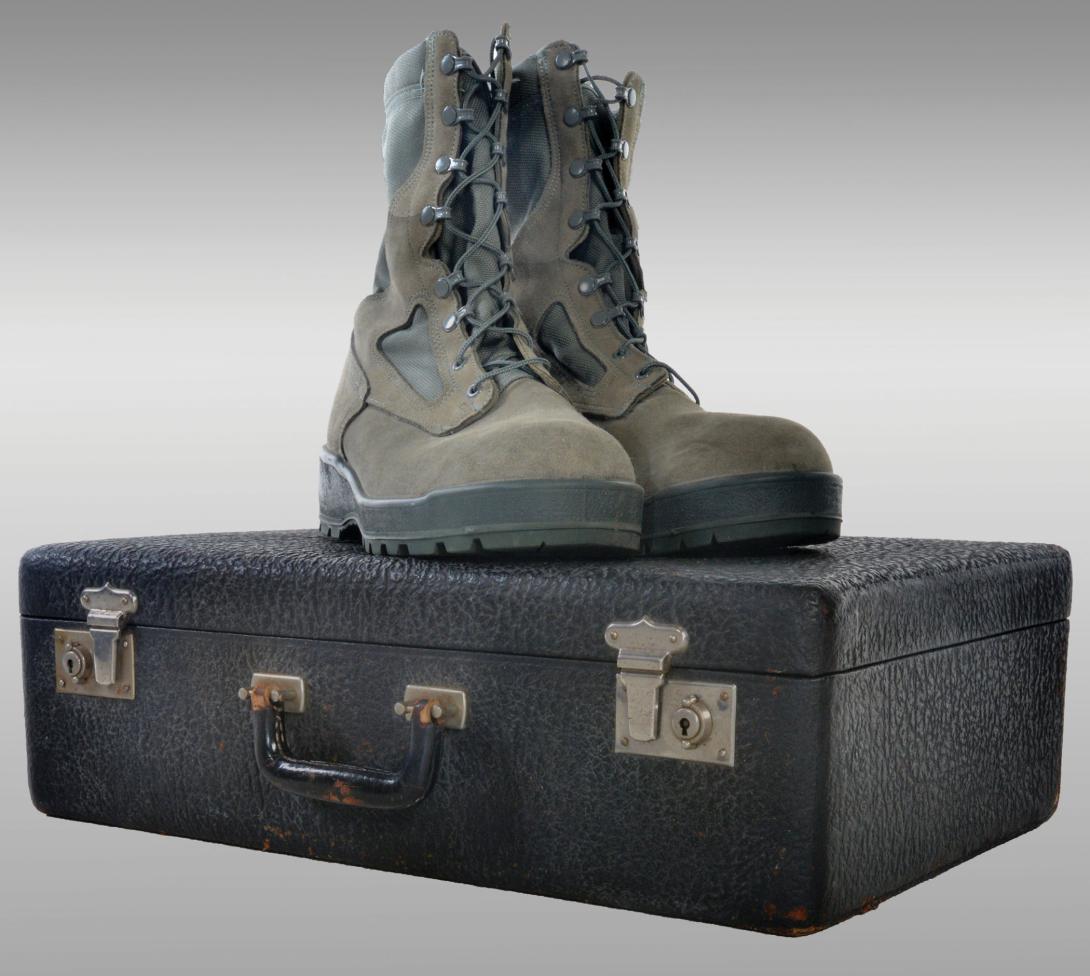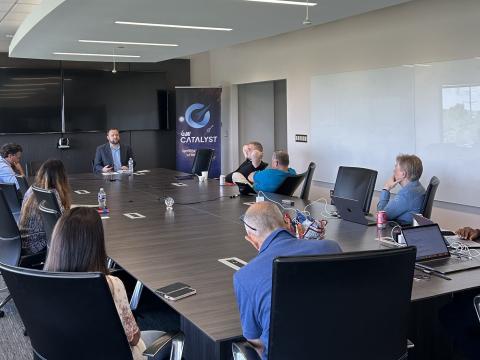From Service to Start-up, SBA Gives Veterans a Boost
Veterans who long since have left military service soon might be eligible to partake in a popular Small Business Administration program aimed at aiding them to enter the world of entrepreneurship. Agency officials are finalizing details on a nascent effort to broaden its Boots to Business program, once restricted to the confines of U.S. military installations and to active duty personnel separating from military service.
“We’re now in the process of making the Boots to Business program available to veterans who have already transitioned and in areas local to them,” says Small Business Administration (SBA) Veteran’s Business Associate Administrator Rhett Jeppson. “Most veterans don’t stay near bases when they leave the service. Many return home. Most bases are on one coast or the other. So we’re working with district offices and resource partners, core chapters and small business developers to make Boots to Business available to them where they live at now.”
The initiative, still under development, is an effort to reach the 22 million veterans who have no access to a military base. “There’s a component of them who we’d like to participate in this, and we want to make sure they have the opportunity to find out if opening a business is right for them,” Jeppson says.
Over the next five years, about 1 million members are expected to leave the military service. Today’s troops, especially midlevel officers, are being forced out as the United States withdraws its combat forcess from Afghanistan and winds down its longest war in history. Those caught in the exodus join an already difficult job market in which unemployment for veterans, at 9.2 percent, is higher than nonveteran peers, which stands at 7.5 percent, according to U.S. Bureau of Labor Statistics data from this fall.
So aiding veterans simply makes good business sense, Jeppson says. Veterans are 45 percent more likely to be small business owners than people with no military experience, and veterans own one in 10 small businesses across the United States. “That’s just a little bit shy of 10 percent. That’s pretty impressive since [veterans] make up less than 1 percent of the population.”
Their businesses, too, prove profitable. “If you look at the annual receipts we bring in, it is over $1.5 trillion every year,” declares Jeppson, whose extensive experience includes combat military service, small business management and directing a state’s procurement activities. He is a political appointee to the SBA post, a job he has held since 2012. He currently serves as a lieutenant colonel in the U.S. Marine Corps Reserve.
“That’s a pretty big number,” he adds. “Veteran-owned small businesses are a pretty important part of our national economy—not just because they were service members and made sacrifices for our country, but because they do so well in small business. One out of every two new jobs is created in small business in America. It is important we encourage veterans who already have a proven track record to go into small business because of their high success rate.” Boots to Business is a small part of the agency’s overall 8(a) Business Development Program established to help small, disadvantaged businesses compete in the marketplace and gain access to the U.S. economic mainstream.
The agency has ramped up its support of veterans over the past decade, says Lisa Wolford, a former participant of the SBA’s 8(a) benefit. In 1997, she started Constellation West, an information technology engineering company with nearly 200 employees across 20 states—but not before serving for three and a half years in the Marine Corps as a field radio operator and leaving under a hardship discharge to care for her disabled son (SIGNAL Magazine, March 2010, “Small Business Targets ...). Then, as a single parent, she attended university, graduating in 1992 with a Bachelor of Science in business administration with a triple specialization: management information systems, accounting and Japanese strategic information systems. And she graduated magna cum laude.
“In the beginning, there were factions within the SBA … that were not friendly toward veterans. They’ve done a complete 180. They are great advocates for veterans today,” says Wolford, a mentor to five entrepreneurs and a board member for Final Salute, a program that finds transitional housing for homeless female veterans and their children.
“The SBA really entered into my life when I started going after the federal market. Back then, service-disabled veteran-owned small business was not a socioeconomic category that anybody in the federal government was measuring or caring about. I was a woman-owned small business, but that was it. I applied for 8(a) and did get certified as 8(a), which is quite a process to get done.”
In 2013, the Defense Department launched a transition assistance program (TAP) virtual curriculum through the joint knowledge online (JKO) system for separating members unable to attend the TAP program in person and made the virtualized program available to veterans and spouses of service members.
The SBA enables veteran-owned small businesses in three key areas: counseling and training, capital and contracting, Jeppson says. The SBA participates in TAP by offering the Boots to Business program, generally a two-day in-class seminar followed by an eight-week online course taught by instructors from partnering university-level business schools, including Syracuse University, University of California, Los Angeles, Cornell University and the University of Connecticut. “We have professors from some of the best business schools in America to teach those courses.”
Separating service members enroll in TAP a year before leaving active duty service, and many know that far in advance what they would like to pursue upon leaving, Jeppson says. “Boots to Business is where they begin to lay the foundation in small business ownership,” Jeppson says.
Additionally, the SBA has the Service-Disabled Veteran-Owned Small Business Concern Procurement Program, which gives procuring agencies the authority to set acquisitions aside for exclusive competition among service-disabled veteran-owned small businesses and the authority to make sole source awards to service-disabled veteran-owned small businesses if certain conditions are met.
Outside of the Washington, D.C., area, few veteran-owned businesses work with the federal government. But around the nation’s capital, it is a prime market. For years, the SBA had a statutory goal of 3 percent of federal prime contracting dollars allocated to service-disabled veteran-owned small businesses. For years, the agency fell short of the goal, except for the past two years. In fiscal 2012, the agency hit it with 3.03 percent, and in fiscal 2013, it reached it with 3.13 percent. “That’s a substantial chunk of change going to [service-disabled] veteran-owned small businesses,” Jeppson says. “We’ve done pretty well in that, and we’re excited. It’s been an emphasis of the administration to really make sure that veterans have contracting opportunities.”
The landscape of what the SBA offers veterans changes, and Jeppson recommends veterans make regular checks to the agency to see if any are applicable to them. In October, the agency instituted Veterans Advantage, a program in which veterans seeking business loans of more than $350,000 will pay half of the borrowers’ fees paid by their peers. The borrower fee remains at zero for loans less than $350,000.
The SBA also partnered with Syracuse University’s Institute for Veterans and Military Families and the university’s Whitman School of Management on a program to provide women veterans tools to becoming successful entrepreneurs. The effort, Veteran Women Igniting the Spirit of Entrepreneurship (V-WISE), is eight weeks of online training followed by three to four days of in-residence training.
“Interestingly enough, when we look at the Boots to Business program, women overindex in the program,” he says, meaning there is a higher percentage of women enrolled in the classes than is the percentage of women on active duty. “That’s because women are leaving at a faster rate. We see women choosing the entrepreneurship track ... because a lot of the ladies leaving the service see it as an opportunity to the next step,” Jeppson explains. “At a higher rate, they’re embracing the idea of the American dream of self-employment, making it on your own.”
Veterans overall are successful at it. “People who are drawn to the service are the same type of people who are drawn to small business,” Jeppson continues. “But I also think the service instills in us some basic discipline and values that translate well to small business. It’s not just that they’re willing to take risk or are adventurous, it’s that they are self-disciplined, they’re motivated, they’re interested in doing something different, something for themselves.
“We’re encouraged by that. We think it’s a great trend.”
SIGNAL Magazine compiled Working the Frontline: Job Guide for Veterans to give veterans easy access to a number of useful services—from employers who seek employees with military experience to job fairs, government programs, resource groups and helpful interviewing and resume writing tips.




Comments